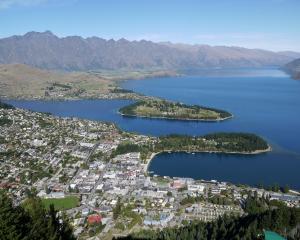
Queenstown Lakes District Council workers installed the signs urging swimmers to stay out of the water on Sunday, after routine monitoring checks found elevated levels of bacteria in the bay area of Lake Wakatipu.
Results from further testing of water quality in the bay carried out later that afternoon showed these levels had subsided.
QLDC chief engineer Ulrich Glasner thanked the community for adhering to the signs and advised beach-goers the bay was now safe for swimming.
The warning signs have been removed and the council would continue to carry out routine water quality testing.
Mr Glasner said the cause of increased levels of E.coli in the bay was "unknown and difficult to identify", suggesting DNA tests of samples taken might indicate the source.
He said it could be related to the "poor weather conditions creating a very choppy lake" and pushing bacteria closer to the bay.
He said it was "unlikely" that celebrations at the beach on Christmas Day and New Year’s Eve would have caused an increase in bacteria levels in the lake.
Tourists visiting the beach on Sunday raised concerns about the poor "perception" the signs would give visitors about the lake’s water quality.
Public Health South has since issued a reminder that those exposed to the contaminated water could develop stomach flu, or gastroenteritis, caused by a variety of organisms that may have been present in the lake.
Dr Marion Poore, Southern DHB medical officer of health, said this was the main health problem resulting from contact with increased levels of E.coli and was most likely to occur between three to 10 days after exposure.
She said symptoms might include diarrhoea, vomiting, abdominal cramps and fever and people could be sick for several days.
"Gastroenteritis can be highly infectious, so maintaining good hand hygiene and staying home while sick really helps to avoid passing illness on to others."
Comments
Pushing bacteria from where into the bay - um from a bigger expanse of water to a more sheltered, enclosed. More likely they've come from the enclosed bay to start with and taken time to be diluted with the water from the bigger expanse hence the problem gone - for now.












